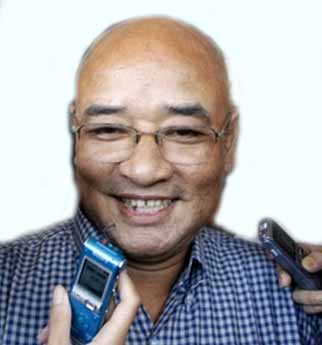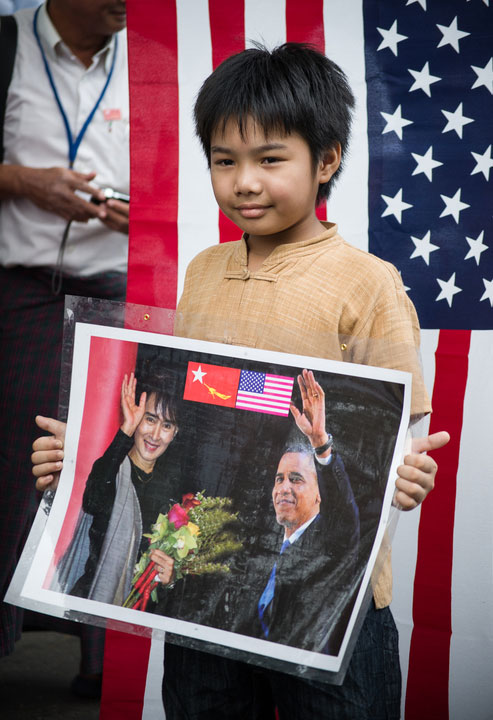Index relies entirely on the support of donors and readers to do its work.
Help us keep amplifying censored voices today.
 Zarganar is Burma’s leading comedian and an accomplished poet, writer, and director who throughout his career has used his artistic talents to draw attention to political repression in Burma.
Zarganar is Burma’s leading comedian and an accomplished poet, writer, and director who throughout his career has used his artistic talents to draw attention to political repression in Burma.
Zarganar was first arrested in 1988 following the pro-democracy demonstrations, in which he played a leading role. As reading and writing were forbidden in his cell in Insein Prison, he mixed dust from the bricks in his cell with water and wrote poetry on the floor, committing the poems to memory and sweeping away the evidence. He was freed after six months.
He was arrested again in 1990 while making jokes at a political rally, and was returned to Insein, where he spent five years in solitary confinement.
Following his release, he was increasingly involved in social activism and worked closely with international NGOs. During the ‘Saffron Revolution’ of 2007, Zarganar was one of the key figures to lead public support. This led to a further three weeks in detention.
Zarganar’s arrest in June 2008 resulted from his criticism of the Cyclone Nargis relief effort. He had personally organised support from the Burmese arts community and oversaw its delivery to the delta. He was angered by the neglect and corruption he encountered and spoke out about this in interviews. In November 2008, he was convicted of ‘public order offences’ and sentenced to 59 years in prison, later reduced to 35 years.
In late 2008, Zargana was moved to Myitkyina Prison in northern Burma, 1,500km from his family home. Zarganar was awarded the inaugural PEN/Pinter Prize for an International Writer of Courage in 2009. He was release from prison in October 2011.
Untitled
by Zargana
Translated by Vicky Bowman
It’s lucky my forehead is flat
Since my arm must often rest there.
Beneath it shines a light I must invite
From a moon I cannot see
In Myitkyina.
Artists came together with political leaders, journalists, academics and lawyers for two days of presentations and discussion on Art of Transition Symposium in Rangoon on 30-31 March.
The programme was another in the series of firsts as the space for expression in Burma opens up.
Of course, this freedom is still a work in progress. The conference had a visit from an official who asked politely how things were going, and Index was told there were a couple of undercover government agents present, who kept an eye on who was saying what.
Some of the most respected artists in the country spoke, including film-maker Min Thin Ko Ko Kyi — who produced the Art of Freedom Film Festival last year with Zarganar and Aung San Suu Kyi — poet Zeyar Lin, who represented Myanmar in Poetry Parnassus as part of the Cultural Olympiad in London, and performance artists Moe Satt, Ma Ei and Aye Ko.
Zarganar, comedian, film-maker and partner of the symposium gave the opening and closing speeches; U Win Tin, patron of the National League for Democracy, and Min Ko Naing, a leading voice in the Generation 88 group, gave the key note speeches on the first and second days respectively.
One of the key questions the symposium asked was how the reforms had affected artists who had developed a nuanced and subtle vocabulary to circumvent censorship. For some it is difficult to find their bearings; several poets admitted it would take time, maybe two years, to make work under such different conditions.
One speaker claimed that poets were being criticised for sounding more like journalists than poets, that the subtlety of their voice had been lost. Another said that he did not want to publish his poems that had been banned in the past because they would no longer be of the moment. Another artist, who had created hundreds of artworks in prison, said that he felt his most free when he was behind bars.
Some of the younger artists Index spoke to felt very differently about the influence of new reforms. They welcomed the openness, the free exchange of ideas, particularly online.
A young performance artist said that her art form was now considered “sexy” and she had plenty of invitations to perform so opening up her work to new audiences. An established poet said that poets have to be more accountable now for what they write. Previously, when all work had to be passed by the censors, the decision about what was published was completely out of the writer’s hands.
As the first symposium of its kind in the country it was necessarily experimental and as much as anything about finding a Burmese way to have a conversation about artistic freedom in public.
Index is producing a short documentary which will be translated into English. An English language podcast is also in production.
Julia Farrington is head of arts at Index on Censorship
Artists came together with political leaders, journalists, academics and lawyers for two days of presentations and discussion on Art of Transition Symposium in Rangoon on 30-31 March.
The programme was another in the series of firsts as the space for expression in Burma opens up.
Of course, this freedom is still a work in progress. The conference had a visit from an official who asked politely how things were going, and Index was told there were a couple of undercover government agents present, who kept an eye on who was saying what.
Some of the most respected artists in the country spoke, including film-maker Min Thin Ko Ko Kyi — who produced the Art of Freedom Film Festival last year with Zarganar and Aung San Suu Kyi — poet Zeyar Lin, who represented Myanmar in Poetry Parnassus as part of the Cultural Olympiad in London, and performance artists Moe Satt, Ma Ei and Aye Ko.
Zarganar, comedian, film-maker and partner of the symposium gave the opening and closing speeches; U Win Tin, patron of the National League for Democracy, and Min Ko Naing, a leading voice in the Generation 88 group, gave the key note speeches on the first and second days respectively.
One of the key questions the symposium asked was how the reforms had affected artists who had developed a nuanced and subtle vocabulary to circumvent censorship. For some it is difficult to find their bearings; several poets admitted it would take time, maybe two years, to make work under such different conditions.
One speaker claimed that poets were being criticised for sounding more like journalists than poets, that the subtlety of their voice had been lost. Another said that he did not want to publish his poems that had been banned in the past because they would no longer be of the moment. Another artist, who had created hundreds of artworks in prison, said that he felt his most free when he was behind bars.
Some of the younger artists Index spoke to felt very differently about the influence of new reforms. They welcomed the openness, the free exchange of ideas, particularly online.
A young performance artist said that her art form was now considered “sexy” and she had plenty of invitations to perform so opening up her work to new audiences. An established poet said that poets have to be more accountable now for what they write. Previously, when all work had to be passed by the censors, the decision about what was published was completely out of the writer’s hands.
As the first symposium of its kind in the country it was necessarily experimental and as much as anything about finding a Burmese way to have a conversation about artistic freedom in public.
Index is producing a short documentary which will be translated into English. An English language podcast is also in production.
Julia Farrington is head of arts at Index on Censorship
President Barack Obama’s speech at Yangoon University appears to be another step in what he described as a “remarkable journey” for the country. The progress does look real.
Back in 2007, BBC special correspondent Fergal Keane wrote a report for Index after he returned from reporting the brutal crackdown on the Saffron revolution.
He alluded to the necessarily secretive nature of entering the country and meeting interviewees:
I won’t go into how I managed to get into the country: suffice to say that I was able to operate for several days without being picked up. It was nerve wracking and posed immense human and journalistic challenges.
While describing the immense difficulties local activists faced, he was optimistic about the role of the web in opening up the country and helping local democrats get their story out. “[T]he “bamboo curtain” has been lowered once again,” wrote Keane. “But not for long I believe.”

Yangon, Burma: A child holds a picture of Aung San Suu Kyi along with President Obama (Demotix)
Five years on, and Burma seemed to have changed almost beyond recognition for Keane:
“Since the beginning of 2012 I’ve visited Burma three times. Each trip has been on an official journalist visa. Not once have I been harassed, intimidated or interfered with. I have reported from city slums and rural villages, from huge opposition rallies and from within sedate government compounds. On my first ‘official’ trip I walked the streets of downtown Rangoon interviewing people at random. Again my expectation was that a secret policeman would appear from the shadows and bundle myself and the camera team away. But nothing happened.”
Shortly before Keane wrote that dispatch, the Burmese government had announced that it was scaling down censorship. On 1 June Tint Swe, head of the Press Scrutinisation and Registration Department was quoted by AFP saying:”There will be no press scrutiny job from the end of June. There will be no monitoring of local journals and magazines.”
Remarkable in a country where newspapers and magazines had faced pre-publication censorship for decades.
After the release of political prisoners in 2011, including opposition leader Aung San Suu Kyi and and satirist Zarganar, the first real test of whether the broader population would enjoy extended free speech under the newly liberalised regime came in January of this year, with the Arts of Freedom Film Festival, which more or less passed the test (barring the rejection of some submissions from outside Burma.
Since then, progress has been pretty much consistent. But there is a long way to go yet. Burma is nowhere near a democracy, and the disturbing reports of violence against the Rohinga Muslim population (and the opposition NLD’s apparent indifference to it) are certainly cause for alarm.
Obama spoke today Burma’s need to embrace Roosevelt’s four fundamental freedoms: freedom of speech, freedom of worship, freedom from want, and freedom from fear. Burma has huge challenges in all these areas.
Padraig Reidy is news editor at Index